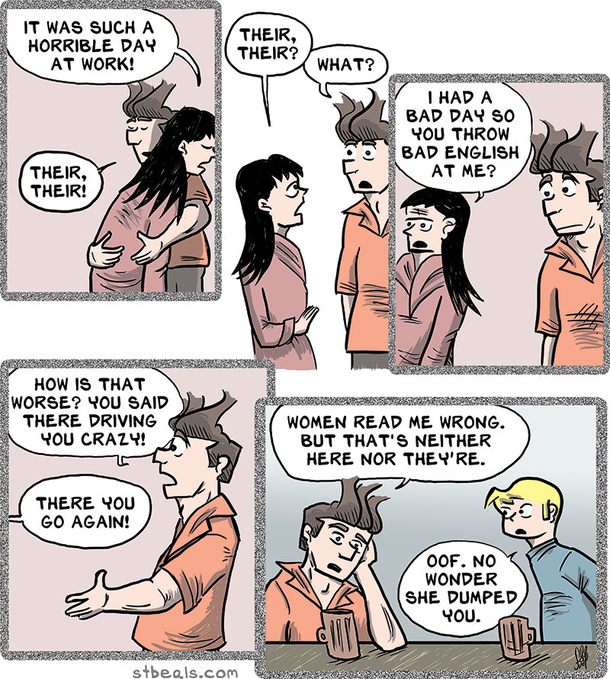

They’re has an apostrophe, which indicates that the two words ( they are) have been merged. Their has the word heir in it, which suggests possession. Keep this in mind to use these words properly: There has the word here in it and it refers to a place. 'Their', 'they're' and 'there' are homophones. There’s A Way To Make Correct Spelling Easy.
THERE THEIR HOW TO
Have you seen the electric bill? I thought I put it in the drawer over there. Year 2 Watch: How to use their, they're or there Homophones are words that sound the same but are spelt differently and have different meanings.I like Tom and Linda, but their house is too far away for a weeknight dinner.There are only so many ways to cook with cabbage before it gets tiresome.I asked the neighbors to turn off the alarm, but it wasn’t _ car.It must be hard for firefighters to sleep since _ always getting called at night.Have you seen the electric bill? I thought I put it in the drawer over _.I like Tom and Linda, but _ house is too far away for a weeknight dinner._ are only so many ways to cook with cabbage before it gets tiresome.Tell the kids they’re going to be in trouble if they don’t finish their homework.Ĭats are fun but they’re not as affectionate as dogs most of the time.įill in the following blanks with the correct usages of their, there, and they’re. Tim called to say his parents were coming to dinner. They’re is the easiest of the three uses to master because it is simply a combination of the two words “they are.” If there is a will to succeed, there is a way to make it happen. There is no question we can benefit from using good grammar. There can also be used as a pronoun that roughly equates to “it is the case that,” a context known as the grammatical expletive. I was there yesterday when Julie came to visit.
THERE THEIR MOVIE
We can go there to watch a movie after dinner. In the first meaning, there can refer to a place that “is not here.” If you would like to correspond with a teacher, ask for their email address. The sentence contains a possessive pronoun, they, and is referencing an object, the pen, that belongs to them. Is anyone in their right mind around here? The words their and there are positively notorious for being confused. In less-formal writing that is becoming more common in formal writing, their also can serve as a singular attributive adjective that refers to a person previously mentioned, about to be mentioned, or present in the current context.Ī parent should lead their child by example. The people we met on our vacation were wonderful. I hope we go to the new Italian restaurant tonight. In precise daily formal writing, their is a possessive pronoun that means “belonging to them.” There was a woodsman, who lived with his wife. Once upon a time, in a now-forgotten kingdom, there lived a woodsman with his wife. Several problems remain with this approach. There remain several problems with this approach. To help you get it right every time, let’s look at the correct usages for their, there, and they’re. If x is a positive number, then there exists there is a positive number y less than x. Or, if you want to look at things from a different perspective, applying them in the wrong context-for instance, using their when you mean they’re-can make your thoughts and ideas seem less impressive. Learning to put each one in its correct place is a great way to write more clearly. Because these words have similar spellings and nearly identical pronunciations, they tend to be commonly misused. They're not an easy group of words, but with practice we know you can master their distinctions.One of the hardest things to master in English is the difference among three very similar words: their, there, and they’re. The last of this trio, their, is the possessive form of they, so it has to do with what belongs to, relates to, or is made or done by certain people, animals, or things:Īnd there you go. They're (=they are) two of our biggest problems. They're (=they are) both really good books. They're (=they are) the cutest puppies ever. Both are connected to the idea of "them." The other two are trickier because they both have the idea of the plural in them. The question is 'Where' and the answer is 'There'. So the way to remember that this one is all about location is just to take the 'T' and replace it with a 'W'. And it's used to signify where something is. It's also the one to use as the first word in sentences that have the subject after the verb:Īnd it's the one used with is and are at the beginning of sentences and questions: Now, first of all we have there T-H-E-R-E which we're gonna use orange for is an adverb and an adjective.
.jpg)
It's about location in the more abstract sense too: It has the word here in it, which can help remind us that this particular word is often about location: There, they're, and their: they sound the same but have different meanings and keeping them straight can be very tricky.


 0 kommentar(er)
0 kommentar(er)
